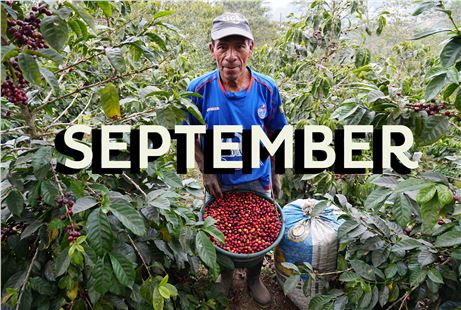THE BENNETTS MONTHLY SEPTEMBER '24

All things Bennetts and Coffee...
Welcome to the September Edition of our Coffee Newsletter! Spring is well and truly on its way…kind of... This month we’re focusing on sustainability, with highlights on Australian Organic Awareness Month and Fairtrade Fortnight. Plus, our monthly market report is here to keep you informed on the latest in the coffee industry. So, take a moment to unwind and explore the world of coffee with us! MARKET REPORT Frosts and Droughts and Fires, oh my! Ok, so no fires (yet) but it wouldn’t be outside of the realms of possibility for everything to go down in flames at this stage… and who among us within the coffee trade wouldn’t welcome the warm, sweet release after the year we’ve had… Last month took us to some heady heights for both arabica and robusta prices, as the markets were embroiled in a perfect storm of sorts. Following the usual lull that accompanies the northern hemisphere’s summer holiday period, the market shook off its post-holiday blues with a good dose of speculator-driven hype. First, we had a teensy bit of cold and patchy light frost in areas of South Minas in Brazil, which although causing minimal physical damage, was enough to kick the already primed market into a bit of a frenzy. At the same time, there’s talk of continued dry conditions in Brazil which could affect next year’s potentially huge crop. Now, it’s normal for it to be dry during this time of year, up to around late September. However, the dry period started in Brazil a good two months earlier than usual, which means soils in the coffee areas are fairly depleted of moisture at this stage… so if it doesn’t rain by the end of the month, with good follow up rains to set the fruit on the trees, we could be in for a rough ride over the next few months. Finally, we also had the combined double First Notice Days (FNDs) of both arabica and robusta September contracts, which added a bit more volatility to the market, just as a treat. So, what was the fallout in pricing? We saw the arabica December contract peak at 259.25 US cents/lb, the highest level since 2011, while robusta set its highest level since being listed at 5180 USD/T for the November contract… Did we mention it’s only September?
Historical NY C Graph 2005 - Present
Historical Robusta London Market Graph 2008 - Present However, even with an inverted price structure, record-breaking prices, an increasingly deteriorating international shipping environment, and now a trucking strike in Colombia, exports from the large origins continue to break records. Global shipments are expected to have been over 10million bags in August, with Brazil leading the charge with above 5-year average exported volumes of Arabica and Conilon (the latter incentivised by the shortfall in Vietnam’s crop last season). While we certainly don’t know where this market may be headed, we will say that those who are waiting for some short-term price relief before deciding to buy coffee may well find they’ll be in the freshly roasted fresh air business before long. This September, we're proud to join the nationwide celebration of Australian Organic Awareness Month (AOAM), a campaign that shines a light on the benefits and importance of certified organic products across Australia. From coffee to fresh produce, and even pet food, the certified organic movement is making a significant impact on how we consume and care for ourselves and the planet. At Bennetts, sustainability and ethical sourcing are at the heart of what we do, and as an Australian Certified Organic (ACO) business, we are deeply committed to upholding the highest organic standards. Our certification ensures that we can provide you with organic coffees that are subject to rigorous testing and verification at every step of the supply chain—from the moment the coffee cherries are harvested to when the beans arrive on your doorstep. Why Choose Certified Organic? The difference between ‘organic’ and ‘certified organic’ is more than just a label. Certified Organic products must adhere to strict industry regulations and standards, such as the National Standard for Organic and Biodynamic Produce or the ACO Standard. These standards guarantee that no synthetic pesticides, herbicides, or fertilisers are used in the production process, ensuring a healthier product for both the environment and consumers. Certified Organic farming practices are also designed to maintain and enhance soil health, biodiversity, and water conservation. This holistic approach supports the long-term sustainability of the land and helps fight climate change by reducing carbon emissions. Bennetts’ Certified Organic Coffees Here at Bennetts, we are thrilled to offer a range of Certified Organic Coffees from across the globe, carefully selected for their exceptional quality and unique flavour profiles. Throughout AOAM, we’ll be highlighting these coffees across our socials, so be sure to follow along to see some of our offerings. Some of our Certified Organic coffees include:
This AOAM, we encourage you to take a moment to consider the positive impact that Certified Organic products can have on the world around you. For more information about our Certified Organic coffee range please contact your Bennetts Account Manager today.
Oromia Union - Wet Mill - Negele Gorbotu Cooperative, Yirgacheffe Region, Ethiopia
Fairtrade Certification plays a crucial role in ensuring that producers, particularly those from economically disadvantaged regions, receive fair prices for their products. This helps them secure a sustainable income, empowering them to improve their livelihoods and invest in their communities. Fairtrade also enforces social, economic, and environmental standards that enable farmers and workers to achieve better working conditions and access essential services like education, healthcare, and clean water. Why Fairtrade Matters Now More Than Ever This year’s Fairtrade Fortnight places an important spotlight on the link between fair pricing and the resilience of farmers in the face of escalating climate and economic challenges. Around the globe, small-scale farmers are increasingly vulnerable to extreme weather events, volatile market conditions, and rising costs of production. Fairtrade helps mitigate these challenges by guaranteeing a fair minimum price, as well as offering additional support through climate adaptation projects, access to financial resources, and community resilience programs. By choosing Fairtrade, you’re not just buying a product—you’re supporting the wellbeing of producers and their families, while contributing to environmental sustainability and gender equality. Bennetts’ Commitment to Fairtrade At Bennetts, we’re committed to ethical sourcing, and we’re proud to offer a diverse range of Fairtrade-certified products that embody our commitment to fair trade principles. Throughout Fairtrade Fortnight, we’ll be highlighting these stories and showcasing the farmers behind the beans. Look out for our social media posts for a closer look at the communities and families your purchases are directly supporting. Finally, we are excited to announce that we will be hosting an event for Fairtrade Fortnight at the Bennetts HQ. The event will kick off with a short introduction from Fairtrade, followed by guest speaker Elizabeth Duna from Papua New Guinea who will share her experiences with Fairtrade. We will also have a selection of Fairtrade coffees for you to try, along with some light snacks! Secure your ticket here – we hope to see you all there!
Climate Change Threats One of the major challenges Vietnamese coffee production faces is the impact of climate change. Over the years, extreme weather events, such as the 2016 El Niño-induced drought, have severely disrupted coffee production, particularly in the Central Highlands, Vietnam's key coffee-growing region. Recent studies suggest that rising temperatures and altered rainfall patterns could reduce the country's Robusta coffee production by 50% by 2050. While this paints a grim picture, there is hope that smart agricultural practices, such as climate-resilient coffee varieties and improved water management systems, could help mitigate these effects. Ageing Coffee Trees and Declining Yields In 2024, about 50% of Vietnam's coffee trees are between 15 to 20 years old, and nearly 30% of the trees are between 20 to 25 years old, which is reducing yield significantly. If these older trees are not replaced with younger, more resilient varieties in the coming years, Vietnam’s overall coffee production could suffer major setbacks. Unsuitable Planting and Intensive Cultivation Practices While new coffee plantations have been established in recent years, many of them are located in unsuitable regions with shallow soil, steep slopes, and insufficient access to irrigation water. These suboptimal growing conditions result in lower productivity and increased production costs. Additionally, the intensive agricultural practices used in the past—such as the overuse of fertilisers and water—have led to soil depletion and increased susceptibility to pests and diseases. Traditional irrigation systems have also contributed to groundwater depletion and environmental degradation, further threatening the long-term viability of coffee farming in Vietnam. Furthermore, inconsistent production practices—such as harvesting both unripe and overripe cherries—have negatively affected the quality of the coffee produced. The lack of adequate dry mills and standardised storage facilities has also hindered the country’s ability to achieve widespread quality certification, limiting its competitiveness on the global stage. Government Action for a Sustainable Future In response to these challenges, the Vietnamese government has been working to implement long-term reforms through its Sustainable Coffee Development Plan, which extends to 2030. The plan focuses on improving the economic performance of the coffee sector while addressing key environmental issues. Key elements include:
The government's goal is to stabilise coffee production and increase export earnings, with an ambitious target of reaching $6 billion in export revenue in the coming decade. As Vietnam's coffee industry moves forward in 2024, the sector's ability to adapt to these challenges will be crucial to its long-term success. With the right policies, investments in sustainable practices, and support from both the government and industry stakeholders, Vietnam can continue to play a leading role in global coffee production, while safeguarding its environmental and economic future. PUBLIC HOLIDAY CLOSURE Therefore, the last dispatch date for orders prior to the public holiday will be on Thursday the 26th of September 2024. Please ensure that you place your order with us prior to 12.30pm on Thursday the 26th, should you require your order to be despatched on the following Monday. |






